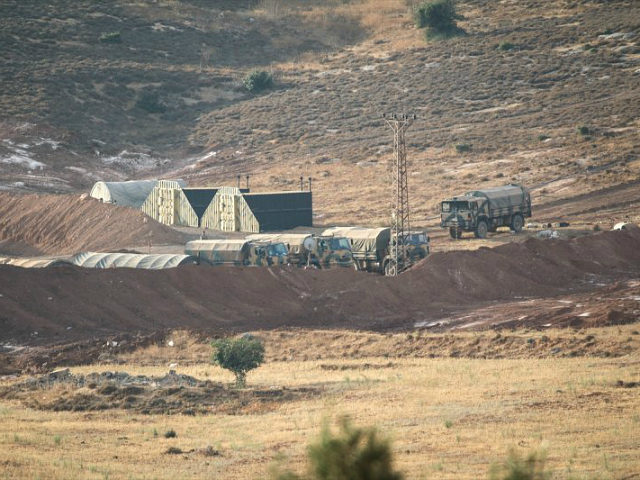Turkey launched a “security” operation in Syria’s Idlib province over the weekend that reportedly included artillery fire in support of rebels from the Free Syrian Army, who were fighting jihadists from al-Qaeda’s Syrian franchise.
Turkey also expressed a desire to prevent the creation of a “terror corridor” coming into Turkey from the east.
“When we don’t go to Syria, Syria comes to us,” Turkish President Recep Tayyip Erdogan said on Sunday, explaining the security rationale for the operation. He also expressed a desire to protect refugees from the battle-torn Aleppo province who sought refuge in Idlib.
Erdogan made it clear that jihadists from al-Qaeda and the Islamic State are not the only security threat Turkey is worried about.
“Let’s not fool ourselves. We should be aware of the reality. We have a 911-kilometer border with Syria. And there is very serious preliminary work in the making of a state. We were already late [in stopping this]. But if we remain silent then this will happen,” Erdogan said, as quoted by Hurriyet Daily News.
“We are obliged to break this terror corridor from the east toward the Mediterranean. We cannot tolerate this. Otherwise, we’ll suffer from another Kobane [incident]. We don’t want that and we won’t allow it,” he added.
Erdogan was alluding to the recent Kurdish independence referendum in Iraq, which stoked Turkish fears of a new Kurdish state reaching through Syria and linking up with the violent PKK Kurdish separatist movement in Turkey. Turkey insists that the Kurdish YPG militia in Syria, a major U.S. battlefield ally against the Islamic State, is allied with the PKK. When the United States decided to arm YPG units in May, Erdogan accused the U.S. of siding with terrorists.
As Hurriyet explains, Erdogan’s reference to Kobane concerned demonstrations held in heavily Kurdish areas of southeastern Turkey in 2014, after the Turkish government was accused of not doing enough to help break the Islamic State’s siege of the Kurdish border town of Kobane.
“Both our hearts and arms are open to those who show friendship to us. But to those who feed enmity towards us I should repeat: ‘We may come suddenly one night,’” said Erdogan, quoting what Hurriyet describes as a “popular nationalist phrase.” It is certainly a contender for the most chilling nationalist phrase of the modern era.
At the same meeting of the ruling AKP Party where Erdogan made his remarks, Prime Minister Binali Yildirim stressed Turkey’s close cooperation with Russia and its desire to enforce the deconfliction zones created at the Russian-sponsored Syria negotiations in Kazakhstan. Hurriyet notes Turkey is also working with Iran, another sponsor of the Kazakhstan talks and another power player in suppressing the Syrian rebellion.
Turkey’s alarm over Kurdish independence is clear, but its relationship with the jihadis who control much of Idlib province is more confusing. Reuters notes that, while there were scattered reports of conflict with jihadi forces, local sources say Turkey’s reconnaissance units were actually escorted into Idlib by fighters from Tahrir al-Sham, the renamed and repackaged Nusra Front, which is al-Qaeda’s organization in Syria. Tahrir al-Sham has been trying to distance itself from al-Qaeda as the tide of battle began turning in favor of President Bashar Assad’s government, thanks to Russian and Iranian assistance.
Some observers speculate that Turkey is attempting to shatter the Tahrir al-Sham alliance by attacking the factions most loyal to al-Qaeda while giving others an opportunity to break away and side with Turkey. Others suspect Tahrir al-Sham is willing to escort Turkish forces to the far side of Idlib province where they can put nearby Kurdish forces in check.
Whatever this report of cooperation between Turkey and Tahrir al-Sham may portend, there were also reports of Turkish forces exchanging fire with Tahrir al-Sham fighters near the village of Kafr Lusin on Sunday. The Free Syrian Army, a rebel group opposed to al-Qaeda and publicly allied with Turkey in Idlib province, said the scuffle began when Tahrir al-Sham fired on a Turkish bulldozer on the Turkey-Syria border.
The London-based Syrian Observatory for Human Rights, a group opposed to the Assad regime, said some of Turkey’s artillery shells “fell near a displaced people’s camp along the border, causing a panic but no casualties.” According to the Observatory, al-Qaeda militants are moving reinforcements into the area to counter the Turkish operation.
As for Turkey’s mission parameters, statements from the Turkish military on Monday indicated the troops that moved into Syria are conducting “reconnaissance activities” and creating “observation points” in the region.
President Erdogan, on the other hand, described Turkey’s mission in Idlib as a “serious operation” that will be in progress for some time to come. Erdogan indicated his forces would work with the Free Syrian Army.
An FSA commander told CNN on Saturday that about 800 fighters from his group are “in a military camp near Reyhanli inside Turkey” and are “waiting to enter” Idlib, once Turkish forces secure passage for their transport vehicles. According to this commander, FSA forces will handle the first stage of the Idlib operation, with Turkish army units moving in later.
Tahrir al-Sham countered with a threat to Free Syrian Army fighters: “If you want to die, orphan your children, make our wives widows, step your feet into Idlib. The news is what you see, not what you hear.”
CNN cites a Turkish military statement that top commanders are in Reyhanli to plan and coordinate the operation, and it notes local television stations are broadcasting images of Turkish tanks lined up along the border, while heavy construction equipment — of the type Tahrir al-Sham reportedly fired upon Sunday — work to clear away the physical border wall.

COMMENTS
Please let us know if you're having issues with commenting.